
Sir Winston Leonard Spencer Churchill was a British statesman, soldier, and writer who was twice Prime Minister of the United Kingdom, from 1940 to 1945 during the Second World War, and 1951 to 1955. Apart from 1922 to 1924, he was a Member of Parliament (MP) from 1900 to 1964 and represented a total of five constituencies. Ideologically an adherent to economic liberalism and imperialism, he was for most of his career a member of the Conservative Party, which he led from 1940 to 1955. He was a member of the Liberal Party from 1904 to 1924.

Lord Randolph Henry Spencer-Churchill was a British aristocrat and politician. Churchill was a Tory radical and coined the term 'Tory democracy'. He participated in the creation of the National Union of the Conservative Party.
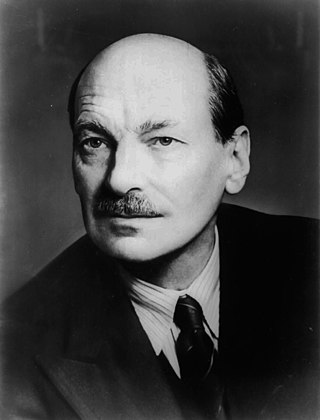
The 1945 United Kingdom general election was a national election held on Thursday 5 July 1945, but polling in some constituencies was delayed by some days, and the counting of votes was delayed until 26 July to provide time for overseas votes to be brought to Britain. The governing Conservative Party sought to maintain its position in Parliament but faced challenges from public opinion about the future of the United Kingdom in the post-war period. Prime Minister Winston Churchill proposed to call for a general election in Parliament, which passed with a majority vote less than two months after the conclusion of the Second World War in Europe.
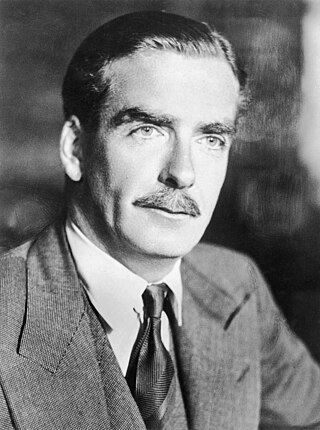
The 1955 United Kingdom general election was held on Thursday 26 May 1955, four years after the previous general election in 1951. It was a snap election: after Winston Churchill retired in April 1955, Anthony Eden took over and immediately called the election in order to gain a mandate for his government. It resulted in a majority of 60 seats for the government; the result remains the largest party share of the vote at a post-war general election. This was the first general election to be held during the reign of Elizabeth II. She had succeeded her father George VI the year after the previous election.
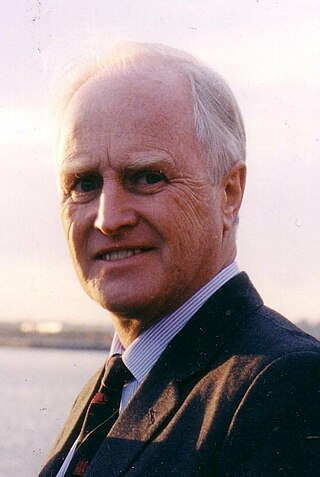
Winston Spencer Churchill, generally known as Winston Churchill, was an English Conservative politician and a grandson of British prime minister Winston Churchill. During the period of his prominence as a public figure, he was normally referred to as Winston Churchill, in order to distinguish him from his grandfather. His father Randolph Churchill was also an MP.

George Joachim Goschen, 1st Viscount Goschen was a British statesman and businessman best remembered for being "forgotten" by Lord Randolph Churchill. He was initially a Liberal, then a Liberal Unionist before joining the Conservative Party in 1893.

The Primrose League was an organisation for spreading Conservative principles in Great Britain. It was founded in 1883.
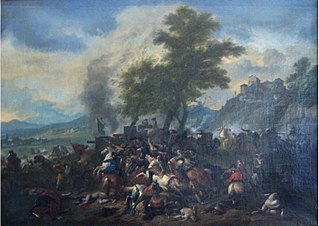
The Battle of Schellenberg took place on 2 July 1704 during the War of the Spanish Succession. The engagement was part of the Duke of Marlborough's campaign to save the Habsburg capital of Vienna from a threatened advance by King Louis XIV's Franco-Bavarian forces ranged in southern Germany. Marlborough had commenced his 250-mile (400 km) march from Bedburg, near Cologne, on 19 May; within five weeks he had linked his forces with those of the Margrave of Baden, before continuing on to the river Danube. Once in southern Germany, the Allies' task was to induce Max Emanuel, the Elector of Bavaria, to abandon his allegiance to Louis XIV and rejoin the Grand Alliance; but to force the issue, the Allies first needed to secure a fortified bridgehead and magazine on the Danube, through which their supplies could cross to the south of the river into the heart of the Elector's lands. For this purpose, Marlborough selected the town of Donauwörth.
Oldham was a parliamentary constituency centred on the town of Oldham, England. It returned two Members of Parliament (MPs) to the House of Commons of the Parliament of the United Kingdom. The constituency was created by the Great Reform Act of 1832 and was abolished for the 1950 general election when it was split into the Oldham East and Oldham West constituencies.

The Churchill war ministry was the United Kingdom's coalition government for most of the Second World War from 10 May 1940 to 23 May 1945. It was led by Winston Churchill, who was appointed prime minister of the United Kingdom by King George VI following the resignation of Neville Chamberlain in the aftermath of the Norway Debate.

The Churchill caretaker ministry was a short-term British government in the latter stages of the Second World War, from 23 May to 26 July 1945. The prime minister was Winston Churchill, leader of the Conservative Party. This government succeeded the national coalition which he had formed after he was first appointed prime minister on 10 May 1940. The coalition had comprised leading members of the Conservative, Labour and Liberal parties and it was terminated soon after the defeat of Nazi Germany because the parties could not agree on whether it should continue until after the defeat of Japan.
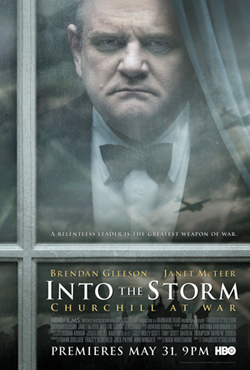
Into the Storm or Churchill at War(alt. title) is a 2009 biographical film about Winston Churchill and his days in office during the Second World War. The movie is directed by Thaddeus O'Sullivan and stars Brendan Gleeson as the British Prime Minister. Into the Storm is a sequel to the 2002 television film The Gathering Storm, which details the life of Churchill in the years just prior the war. Into the Storm had its first public premiere on HBO and HBO Canada on 31 May 2009.
Zachariah John Churchill is a Canadian politician from Nova Scotia. He serves as the member of the Nova Scotia House of Assembly for Yarmouth, first elected in 2010.
William Oliver Churchill, (1914–1997) was a Special Operations Executive (SOE) officer during the Second World War.
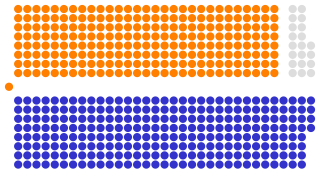
The 1705 English general election saw contests in 110 constituencies in England and Wales, roughly 41% of the total. The election was fiercely fought, with mob violence and cries of "Church in Danger" occurring in several boroughs. During the previous session of Parliament the Tories had become increasingly unpopular, and their position was therefore somewhat weakened by the election, particularly by the Tackers controversy. Due to the uncertain loyalty of a group of 'moderate' Tories led by Robert Harley, the parties were roughly balanced in the House of Commons following the election, encouraging the Whigs to demand a greater share in the government led by Marlborough
The 1908 Dundee by-election was a Parliamentary by-election held on 9 May 1908 for the constituency of Dundee. The constituency returned two Members of Parliament (MP) to the House of Commons of the United Kingdom, elected by the first past the post voting system.
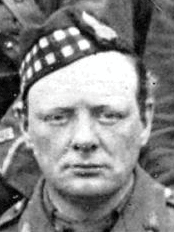
The 1917 Dundee by-election was a parliamentary by-election for the British House of Commons constituency of Dundee in the county of Angus held on 30 July 1917.
Gary Vidal is a Canadian politician who was elected to represent the riding of Desnethé—Missinippi—Churchill River in the House of Commons of Canada in the 2019 Canadian federal election. In April 2024, Vidal, whose electoral boundary changed due to his residence being shifted, announced that he would not run for re-election in the 45th Canadian Federal Election because he did not anticipate that his party would not allow for an open nomination.

The statue of Winston Churchill in Woodford, London, is a bronze sculpture of the British statesman, created by David McFall in 1958–9. The statue commemorates Churchill's role as the member for the parliamentary constituency of Woodford. Churchill was elected to the Epping seat in 1924 and held it until 1945 when the new constituency of Woodford was created. Churchill then held this seat until his retirement in 1964. The statue is a Grade II listed structure.